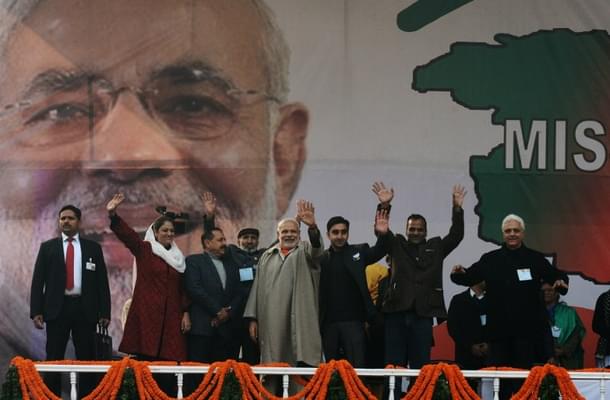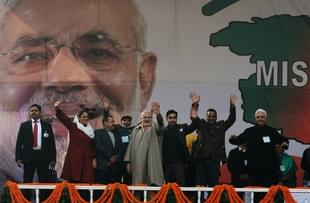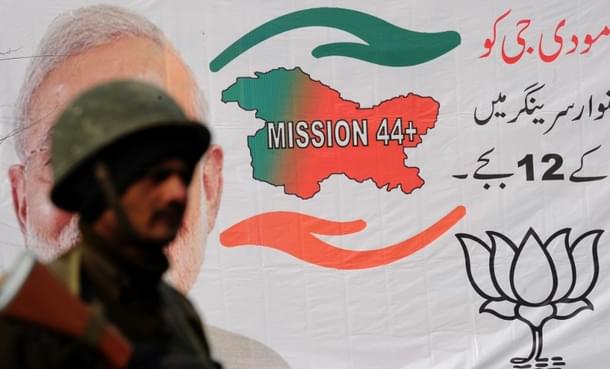Politics
Did the Valley Snub Modi?
Saswati Sarkar
Dec 24, 2014, 05:03 PM | Updated Feb 10, 2016, 05:22 PM IST
Save & read from anywhere!
Bookmark stories for easy access on any device or the Swarajya app.


What does the Prime Minister have to show for the compromises he made in Kashmir?
The Bharatiya Janata Party (BJP) had targeted an absolute majority of 44+ seats in the recently concluded Assembly election in Jammu & Kashmir. Quite a few political analysts of repute did not a priori rule out the target as mission impossible. Yet, a dispassionate number crunching based on demographics of constituencies and the results of the Lok Sabha polls held in May 2014 revealed that the target was beyond the realm of possibility.
Going by the Assembly-wise break-up of Lok Sabha constituencies, the BJP had won every Hindu-majority Assembly seat in Jammu in the May elections, and had either won or narrowly lost in the two Buddhist majority seats in Ladakh. The number of votes it secured in the rest of the seats throughout the state, all of which were predominantly Muslim, had been substantially below that of the winner. Thus, unless the BJP made significant inroads into the Muslim populace of the state, it could not have won above 30 seats. Given that the Muslim electorate nationwide had largely not been moved by Prime Minister Narendra Modi’s development campaign, there was no reason to expect that those in Jammu & Kashmir would cast their votes for BJP in less than 6 months.
The election strategy of BJP however seemed to revolve around the Muslim majority Kashmir valley ― so, clearly, the Kashmir strategists of the party believed that they would make inroads into the hitherto elusive Muslim votes. When the Kashmir valley was devastated by floods, the prime minister visited it twice, tweeted in empathy with the victims; none of the above were visible when Assam and Odisha, which are not scheduled for imminent polls, suffered natural calamities. He chose to spend Deepavali in Kashmir, not quite in Vishakhapatnam, which was devastated by a cyclone. One is not quite sure if he stopped in Jammu en route Srinagar, which had its own share of flood misery. It was obvious that he was courting the Valley, keeping in mind the imminent elections.

As a politician, the BJP’s biggest star campaigner is absolutely right in trying to win over the minorities who have so far by and large rejected his party. What is, however, objectionable is that he compromised with several of the party’s core ideologies in the process. To start with, he met with former separatist Sajjad Lone ― premiers worldwide usually eschew such company. The founder member of the BJP Shyama Prasad Mookerjee was, once upon a time, martyred while he was protesting entry barriers for Indians from outside Jammu & Kashmir to the state.’
Ever since, the BJP had advocated abolition of Article 370, which gives special status to the state and disallows other Indian citizens, who are originally not from the state, from settling in it. In this election, however, BJP refused to take a stand on article 370. Worse, it fielded Hina Bhatt who threatened, in public, to take up guns if Article 370 was abolished. In a rally in Srinagar, Modi eschewed his customary concluding chant of Bharat Mata Ki Jai. He had thus far concluded his rallies everywhere else with this homage to his motherland including in those outside India, for example, in New York. Symbolism is an integral component of politics; it is up to the discerning reader to infer the significance of this particular one.
Last but not the least, Modi violated a code of conduct that is strictly adhered to in most established democracies of the world ― he implicitly undermined India’s defence institution that reports to him in an election rally. The Indian Army had recently accepted responsibility for accidental shooting of two Kashmiri teenagers. The Prime Minister used this incident to claim political brownie points! His exact words were: “For the first time in 30 years, the army has accepted its error. Punishment has been accorded. I am here to deliver justice.”
In other words, he reaffirmed that the Army had erred before and had not accepted its earlier errors. This is quite consistent with the line separatists and human right activists have taken that the Army routinely violated human rights. Taking a cue from the speech, BBC immediately applauded Modi for acknowledging that Indian Army was trigger happy!
No one can deny that in a civilian democracy as in India’s a PM is within his rights, or it is even his duty, to ensure accountability in his armed forces. Equally, the Army ought to accept responsibility for its errors, which cannot always be avoided in counter-insurgency operations despite the best of intentions. The PM may well apologise for the Army’s unintended excesses as appropriate. No one objected, for example, when Defense Minister Arun Jaitley apologised on behalf of the Army right after the incident. It is but unacceptable that a political authority would assume credit in public for disciplining his Army, and more so appeal for votes on that count. Such avoidable choices leave open the nagging question whether due process in the Army was bypassed for political expediency of the ruling party..

A good leader should, in fact, assume the blame accorded to the institutions that report to him. How are the subordinates expected to trust a political authority who insinuates in public the same accusations its detractors are hurling at it? Shouldn’t earning the confidence of the institutions that report to the Prime Minister be his foremost priority? It is for these reasons that no Indian premier since Jawaharlal Nehru had publicly undermined India’s defense institutions. We have to wait and watch to find out if, in quest of political power, Modi has initiated a brand of politics where the Army would be dragged in by political parties for competitive denouncing for a few votes. This would inflict enormous damage on an invaluable institution.
This writer is strongly opposed to the politics that sacrifices core values at the altar of electoral success. But, it turns out that these controversial choices by the Prime Minister did not earn the electoral reward he was hoping for. The BJP got 25 seats well below its target of 44. Unlikely that the above choices enhanced the party’s vote share in the Jammu region, which is the only region where it won. In fact, it lost Bishnah and Nagrota, two Hindu majority seats in Jammu, which have a high concentration of former soldiers (not implausible that they resented the Prime Minister’s undermining of the Army).
Many analysts have observed that the BJP’s focus on the Valley has cost it votes in Jammu. It also lost both the seats it was in contention in Ladakh. It had won Ladakh for the first time in this year’s general elections. A greater focus on it may well have consolidated the BJP’s hold in this region. In contrast, in the Kashmir valley, on which the BJP focused, it lost all the seats it contested. It lost deposits in all the seats except one in and around Srinagar where Modi had held his controversial rally. Bhat, who was being projected by the BJP as its developmental face, counts among those who forfeited their deposits. It is clear that Modi’s questionable choices didn’t yield any electoral dividend, and may have cost a few seats. Finally, the BJP won 3 seats less than that won by the single largest party, PDP.
A case is being made out by BJP sympathisers that the party’s moves were directed towards enhancing turnouts. High turnouts would demonstrate to the world that India holds free and fair elections in Kashmir; the citizens have full faith in Indian democracy, and that they refused to heed the call for boycott issued by the separatists. Free and fair elections have been held before without such compromises from the top leadership of the ruling party. No credible complaint of large-scale electoral malpractices was registered in the previous Assembly polls. The panchayat elections held a couple of years ago registered an even higher turnout despite a boycott call by the separatists — complaints about rigging were largely absent, too.
Next, it is not clear whether voters in the separatist-infested districts of Jammu & Kashmir — only 3 districts qualify to be in this category — who had stepped out to vote had given up their demand for independence. In fact, those interviewed by various media houses went on record to state that they voted merely to prevent a BJP chief minister from assuming office (which is a legitimate exercise of their franchise, but just does not establish that they are avowing loyalty to the Indian Union by participating in its democracy).
Lastly, if voters in the Valley stepped out to deny BJP an outright majority, it has been due to the party’s perceived strength in Jammu and potential gains in Ladakh. They likely wanted to prevent the BJP from winning a few seats in the Valley, courtesy the support of the Kashmiri Pandits who could have made a difference in a low turnout election. If that were the case, it is not clear how the BJP’s controversial choices enhanced the turnout in the valley. All in all, what does the Prime Minister have to show for the compromises he made in Kashmir?




